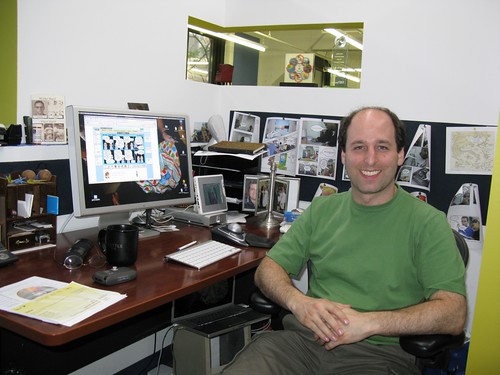The Global Kids are alright
Whilst in New York I visited the offices of Global Kids. Barry Joseph is the Director of its Online Leadership Program, which “integrates a youth development approach and international and public policy issues into youth media programs that build digital literacy, foster substantive online dialogues, develop resources for educators, and promote civic participation.” It’s a program by the kids, for the kids, and involves gaming and virtual worlds, amongst other things.

Barry Joseph of Global Kids
Global Kids and this program are impressive enough to warrant their own blog posts. But right now I just want to throw out a few tidbits from the meeting with Barry.
On virtual worlds:
- Teen Second Life (SL) has value as a social network and a participatory medium. There is also a sense of playfulness associated with it, which is important. Gaming is successful because humans like to play. Barry believes that drawing the art of play into the real world has value. It allows for fresh perspectives. We apply “ludic sensibilities to the mundane areas of our lives”. Teen SL does a good job of building these mental bridges between the playful-virtual and physical-real worlds.
- A product they’re working on is Switchboard, which provides a way for anyone in the world with access to a mobile phone to exchange SMS text messages with users in Second Life. Say Rik Panganiban: “We think there is an enormous opportunity to connect those on the other side of the Digital Divide with the rest of the world through technologies like Switchboard. We’ll be doing an initial public test of Switchboard in the coming weeks with a young person in Africa chatting with other teens from around the world.”
On future collaborations:
The youth at Global Kids worked with New York game developers Game Lab to develop a popular serious game called Ayiti, the Cost of Life. The kids have subsequently helped to create a game called Hurricane Katrina: Crescent in Tempest City. Services that they could offer for the Shuttleworth Foundation, or others in SA:
- To give feedback on game ideas (on a conceptual level), curriculum around a game, game design, etc.
- To user test game interfaces/demos/prototypes.
- To advise on the US youth market, for games that are aimed at, or repurposed for, that market.
These services might cost, or might be for free. A conversation needs to happen to establish this.



